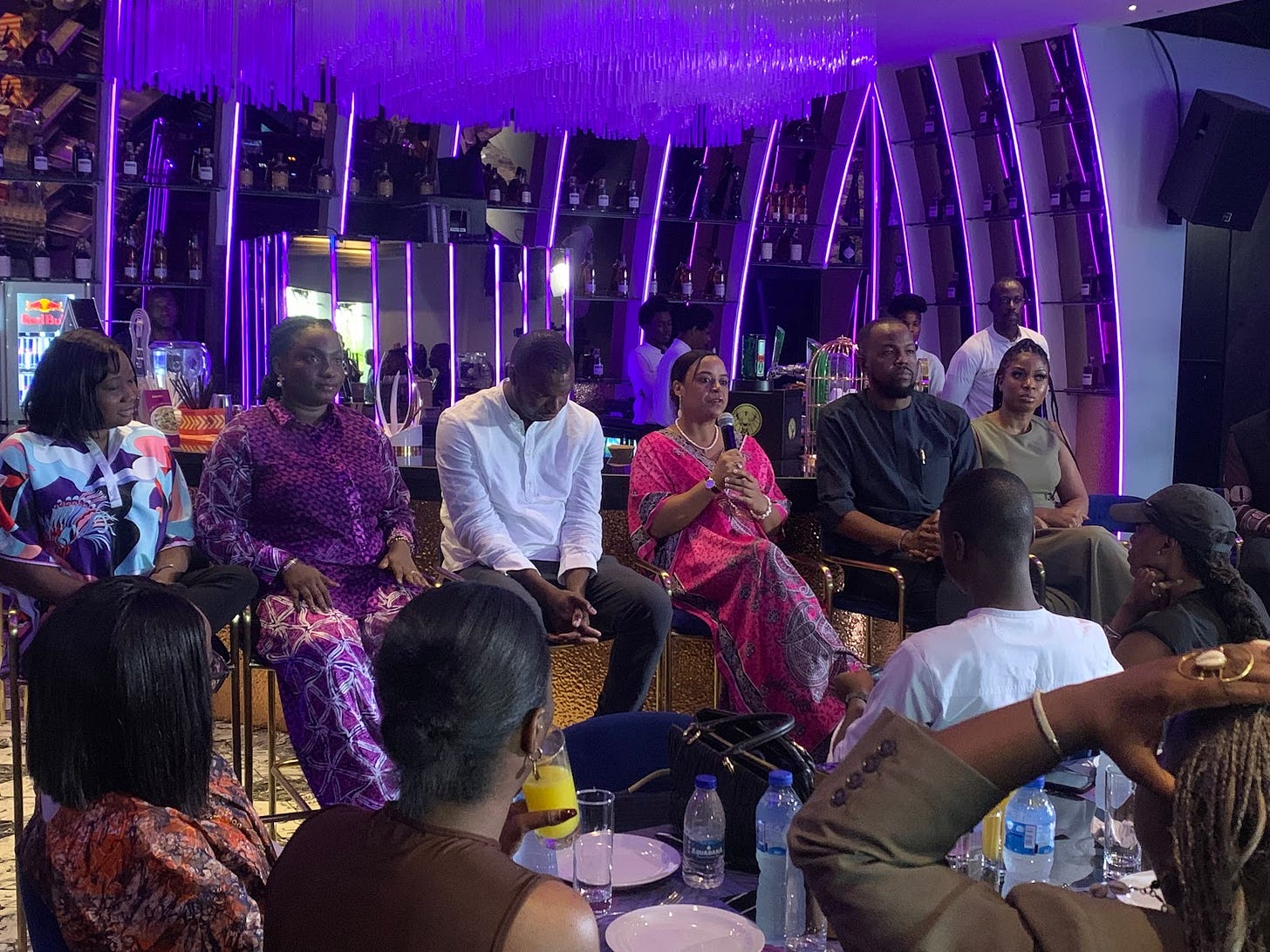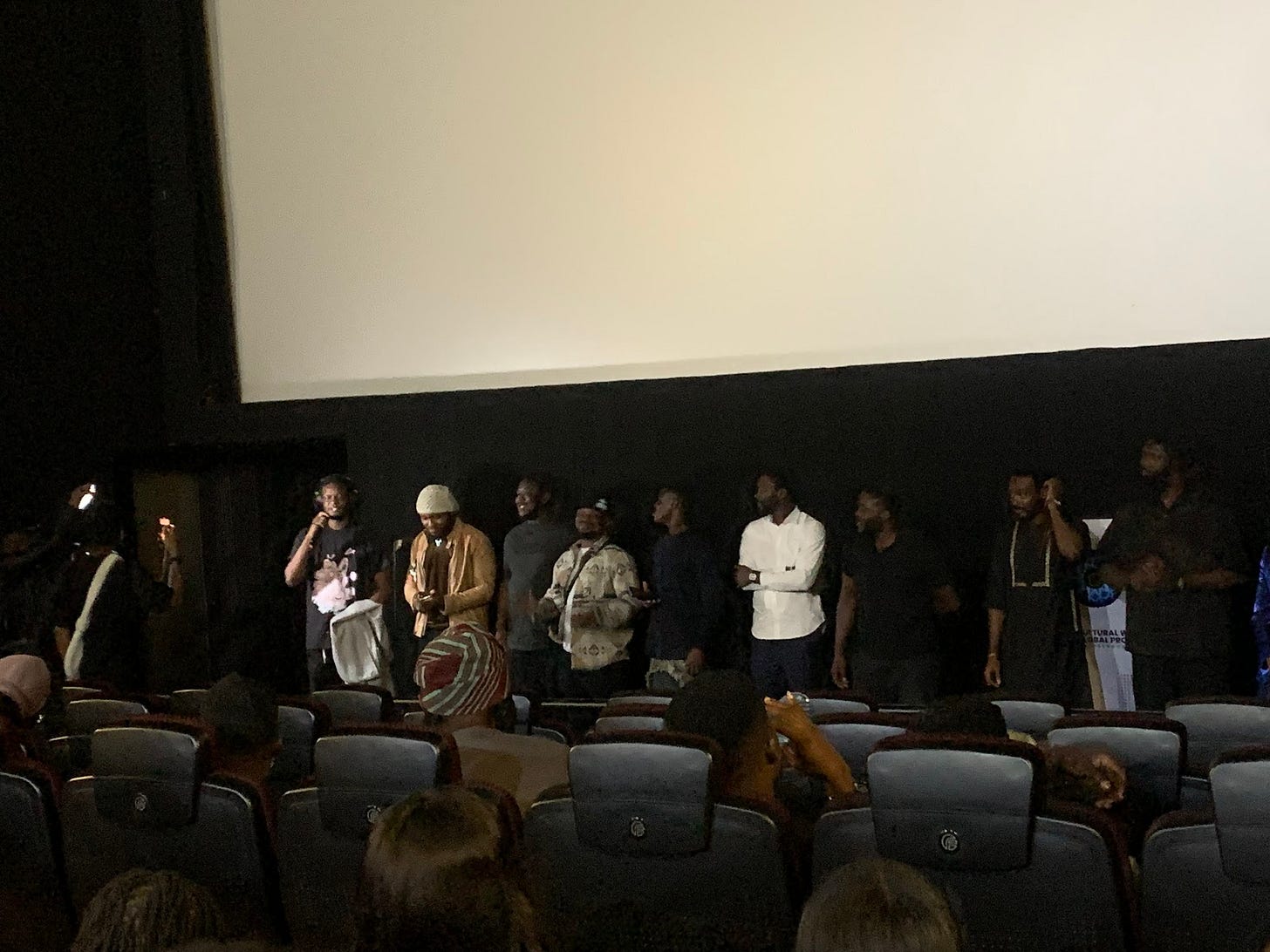AFRIFF Day 4: Filmmakers Are Not Holding Back in Attempting to Reach the Inner Crevices of Our Emotions
Day 4 of AFRIFF featured powerful films like Ebrohimie Road and The Legend of the Vagabond Queen of Lagos, highlighting the depth of African storytelling despite the festival's logistical challenges.
This is coming a day late, perhaps I am simply following the flow of the festival, which has simply chaotic.
I began my day by attending a panel session on The Role and Place of Faith-Based Films in Mainstream Media. The panel lineup—BB Sasore, Kemi Adesoye, Michelle Bello, Kene Okwuosa, and Laju Iren—drew me in, particularly because I had interviewed BB Sasore before.
He had mentioned how he is often misunderstood as a filmmaker called to preach the gospel through his faith-based films. Sasore himself was quick to debunk this myth during the session, stating that one does not necessarily need to be certain of a divine calling to tell a faith story.
The session also covered the challenges that faith-based films have faced and continue to face, such as film quality, finding suitable distribution channels, and securing funding. The panelists agreed that while there is a market for these films, it is crucial for people, particularly those of faith, to invest in them.
After the panel session, I set out to watch my first film of the day, Ebrohimie Road, directed by Kola Tubosun. This was my second time watching the film, which explores Wole Soyinka’s time at the University of Ibadan and his residence on Ebrohimie Road.
Once again, I was captivated by the significance of the house and Soyinka’s role in the lives of many notable figures in Nigerian arts and literature. This time, I picked up new insights about the Nobel Laureate. Soyinka was drawn to houses made of wood, and wherever he lived, the buildings seemed to become characters connected to his soul.
He recounted, “I campaigned for that house, I lobbied for it, cheated for it, beat people up for it. I basically gave everything to get that house.” Another revelation was how Soyinka’s deep connection to his artworks impacted him. When many of his carvings and art pieces were taken by expatriates during his arrest and subsequent release, it contributed to his decision to go into exile.
This reminder of Soyinka’s humanity made me reflect on how the things we cherish most profoundly affect us. Author and poet Niyi Osundare mentioned in the film, “Soyinka was popular among the students but not in the same way among the staff.”
One of the reasons Soyinka was denied his professorship was that he did not comb his hair—a criterion that seemed both comical and absurd. As someone with a penchant for nostalgia, I doubt I will ever tire of seeing Ebrohimie Road. Even after interviewing Kola Tubosun earlier this year, I am sure I will find something new and gripping each time I watch it.
Next on my list was Aisha Salaudeen’s short film, We Have Bleach, which began screening thirty minutes behind schedule. I had interviewed Aisha earlier this year and had eagerly anticipated this film. Clearly, I wasn’t alone, as the hall was packed to capacity. I couldn’t find a seat, and the only available one was occupied by a woman who had left and returned to reclaim it rather abruptly—though she never actually sat in it.
Resigned to sitting on the aisle step, I watched the film, which turned out to be a brilliant balance of humor and weighty emotion. We Have Bleach resonated deeply, capturing the full spectrum of emotions. Unfortunately, AFRIFF did not provide time for a Q&A and we were asked to take our questions outside as another film was about to be screened.
Despite feeling frustrated by the lack of organization, I moved on to Adindu Collins’ God-Dafi, an intriguing story blending symbolism and the supernatural. It follows Jabar (Paul Nnadikwe) and Ene (Tomi Ojo), a couple facing financial struggles while expecting a child. They soon find themselves confronting supernatural threats tied to an ancient prophecy.
Watching this film reminded me of seeing Paul Nnadikwe in Ishaya Bako’s I Do Not Come To You By Chance and Tomi Ojo in Kenneth Gyang’s Mojisola during last year’s AFRIFF. I appreciated the film’s exploration of supernatural themes from an African perspective. When I asked Adindu why he believed this ambitious story was important now, he said, “The film matters because it explores the need for us as Africans to look inwards and find the light within us, as that is something the world needs now more than ever.”
My last film of the day was The Legend of the Vagabond Queen of Lagos, starring Temi Ami-Williams (Eyimofe). Getting into the screening hall was a struggle, with an overwhelming crowd and chaotic pushing. It felt reminiscent of last year’s festival.
However, the film made up for the difficulty. Based on true events, the story follows Jawu (Temi Ami-Williams) and her son Daniel, who live in the waterfront slum of Agbojedo. Jawu’s life changes when she discovers a large sum of money. Directed by seven filmmakers—Matthew Cerf, James Tayler, Bisola Akinmuyiwa, Samuel Okechukwu, Temitope Ogungbamila, Tina Edukpo, and Elijah Atinkpo—the film delves into themes of community, bad leadership, and the greed that impacts underprivileged communities.
While the film depicts poverty, it goes to great lengths to show that joy can exist even in the face of hardship. The mother-son bond between Jawu and Daniel illustrates that some things are more important than money. The people of Agbojedo share a unique language, love, joy, and unity.
They have their songs, dance, and collective spirit, embodying resilience. This was a fitting way to end the day, though I couldn’t shake the realization that the struggle to enter the screening halls might be even worse the next day.
It got a little worse.






love reading your reflections